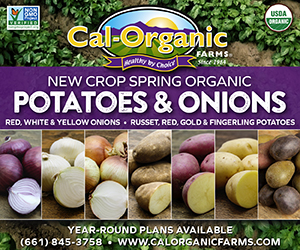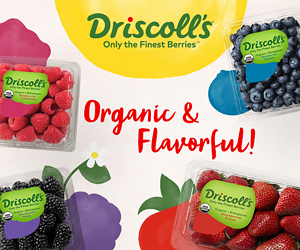1. Trump's 2018 Budget Makes Cuts to Organic Programs
President Donald Trump's FY2018 budget proposal seeks to eliminate or cut dozens of federal programs, and those supporting the nation's organic industry are no exception.
The $4.1 trillion budget request was unveiled Tuesday just as the Organic Trade Association (OTA) released its annual organic industry survey, which showed U.S. sales of certified-organic food and beverage products hit $43 billion in 2016, increasing 8.3 percent.
The budget request seeks to slice more than 10 percent off the USDA's National Organic Program (NOP) current $9 million budget and also zeroes out the $4 million in funding for the Organic Transitions Program, a research grant program that helps farmers overcome some of the challenges of organic production and marketing.
Trump's proposed budget for FY2018 also eliminates funding for the USDA's two organic certification cost share programs, and laid out changes for the National Organic Standards Board (NOSB).
The budget does increase the USDA's flagship organic research program, Organic Agriculture Research and Education Initiative, from $19 million to $20 million. Just last week, federal legislation was introduced in the U.S. House of Representatives seeking to more than double funding for the OREI to $50 million from 2018 to 2023.
2. Rise of global organic equivalency pacts weigh on U.S. organic exports
The United States remains the world's largest organic market, representing more than half of all consumer sales for organic products globally, according to the Organic Trade Association's (OTA) new report, "U.S. Organic Trade Data: 2011 to 2016."
The value of organic imports, $1.7 billion in 2016, has increased by 34.4 percent from 2014. The U.S. imports organic products from at least 111 different countries. Mexico is the leading supplier of organic products to the United States.
The new report includes an overview of organic equivalency agreements worldwide and their impacts on organic trade. The USDA currently maintains organic equivalency arrangements with Canada, implemented in 2009; the European Union (EU), implemented in 2012; and Japan and South Korea in 2014; and Switzerland in 2015. The report also said more research is necessary to "fully understand the impact of an organic equivalency arrangement between two countries where neither has an arrangement with the U.S., but they have an arrangement with each other."
U.S. organic exports have remained stable from 2013 through 2016, when their value was $547.7 million, according to the report. Exports of U.S.-grown organic produce still account for the bulk of U.S. organic exports. The U.S. exporters shipped organic products to at least 104 different countries, the two largest were Canada and Mexico, while 61 percent of U.S. organic exports were shipped to U.S. organic equivalency partners.
East Asia and the Middle East continue to gain market importance - the value of measured organic exports to the United Arab Emirates substantially increased during 2012- 2015 from $1.2 million to $14.4 million.
3. Unlocking the Power of Produce to Help Feed the World
According to recent studies, upwards of 12 percent of all of fresh produce is lost to spoilage. The reduction of this waste could help meet the food needs of a growing domestic and world population.
Agricultural innovator Apeel offers a potential alternative to waste and spoilage through plant-derived products that can extend shelf life. Apeel extracts active compounds from the farm waste (for example, leaves, stems, peels) of specific crops to create its Edipeel line of FDA GRAS, certified organic products. Edipeel is available for bananas, lemons and limes, mangos, berries, green beans, and several others. The product is applied to the surface of the fruit or vegetable, where it creates a thin, edible barrier on the surface that slows down the rate of spoilage by reducing water loss, oxidation, and microbial activity; it is said to double shelf life.
Natural spoilage begins immediately post-harvest, so Edipeel is most beneficial when applied in the packing house. “By slowing the rate of spoilage, our customers are able to drive new revenue streams from products that couldn’t previously reach a market, or that otherwise would have been lost to spoilage,” says Apeel founder and CEO Dr. James Rogers.
Statistics on world hunger inspired Dr. Rogers to look for spoilage solutions. “Close to one in ten people in the world currently don’t have enough food to eat, and the United Nations reports that we’ll need 60 percent more food by 2050 to feed the growing population,” says Rogers. “The ability to extend the edible and marketable shelf life of fresh fruits and vegetables has never been more important.”
4. UC Santa Cruz Garden Celebrating 50th Anniversary
 In 1967, the newest campus in the University of California system dedicated the Student Garden Project on one of its brush-covered hillsides.
In 1967, the newest campus in the University of California system dedicated the Student Garden Project on one of its brush-covered hillsides.
UC Santa Cruz was a haven for alternative lifestyles and the garden celebrated organic production--a centerpiece of the community’s effort to create a healthier, more sustainable approach to growing food and flowers. The Student Garden Project grew into the UCSC Farm, and gave root to the Agroecology Program, which is now called the Center for Agroecology & Sustainable Food Systems (CASFS).
Generations of new organic farmers and gardeners have been trained at the facility, and the Center has helped shape a more sustainable food system through research and policy efforts.
In 2017, these accomplishments will be celebrated throughout the year in a variety of ways as the Center focus its attention on improving a healthy, socially-just food system for the next 50 years.
In July, the Golden Anniversary will be officially celebrated at the First 50 Celebration & Symposium at UC Santa Cruz, July 28–30. Registration information for the symposium, as well as information on other celebratory events, is available on the UCSC website.
5. Late Author Crusaded for Organic Food Long Before It Was a Big Business
Long before Whole Foods Market Inc. entered the market in affluent neighborhoods across America, Beatrice Trum Hunter was promoting organic foods and fulminating against pesticides and food additives.
Ms. Trum Hunter wrote dozens of books, starting with “The Natural Foods Cookbook,” published in 1961 and promising “more radiant health and greater day-by-day energy.” She served as food editor of Consumers’ Research Bulletin and wrote hundreds of articles offering advice on nutrition, gardening and other topics. She shared research with Rachel Carson, author of “Silent Spring,” and provided material and editing help to Adelle Davis, who wrote “Let’s Eat Right to Keep Fit.”
Read more about her contributions to the organic industry here.

“Organic is no longer a niche market and everyone is taking notice. Salads are driving the growth and we will need lots more product and row crop availability. There is also a corresponding growth in conventional and I see a percentage of both continuing to grow.”
- Almassy Dane, Earthbound Farm






